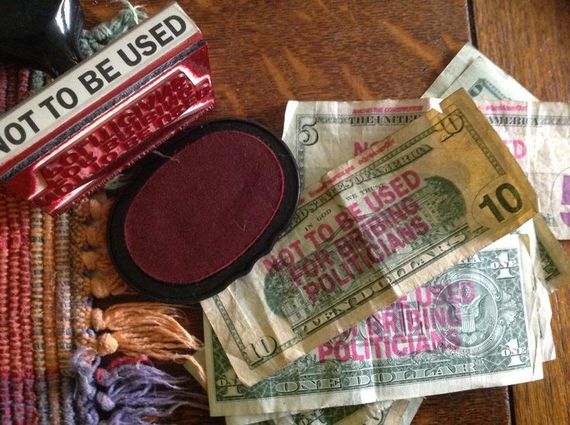
About three years ago, I gave up my credit cards for cold-hard-cash. And not just any cash, but moola with makeup. That's right, I have started to legally rubber stamp dollar bills with messages like "Not To Be Used For Bribing Politicians" in order to build grassroots demand for common sense reforms to get big money out of politics and restore a government of, for, and by the people.
Using cash over credit cards has double the benefits: it's the choice to renounce the deceitful practices of credit card companies that hurt consumers and small businesses; and, it gives you a chance to turn your money into media against superrich special interest groups meddling in Washington's legislative decisions that act against "We the People."
Corporate greed and power has overtaken our political system. Recent Supreme Court rulings chose to empower rich donors over voters. They opened the floodgates to unlimited corporate money influencing our elections and drowning out our voices.
Credit card companies have spent millions of dollars on lobbyists every year to obtain more profit from their debtors with the help of their paid-off friends in Washington. From unfair overdraft fees to perplexing card agreements, creditors have used this backdoor access to Washington in order to shortchange the regular American consumer.
Citigroup and Bank of America spent a combined total of $8,750,000 on lobbyists in 2014. Through lobbyists, credit card companies are currying favors from our politicians with handsome donations -- it's a decades-old political strategy by many special interest groups to strengthen ties with our government at the expense of voters.
"Washington works for those who can hire armies of lobbyists, armies of lawyers, and get just the rules they want. It doesn't work so well for American families," said Senator Elizabeth Warren to Bill Moyers in an interview describing the unfair access of wealthy groups to our legislators.
On record, according to OpenSecrets.org, a nonpartisan organization that tracks money in politics, the current number of "revolving door" employees at JP Morgan Chase that once held public service positions amounts to 15 employees and 12 at Citigroup. In 2014, the finance and credit card industry was employing at least 212 lobbyists with prior positions in the federal government.
This conflict of interest is hurting American consumers. The government employees who worked on behalf of the people to regulate special interest groups use their policy expertise and professional networks to support the questionable agenda of credit card companies. In the meantime, corporate-friendly lawmakers get a boost in slush funds in the form of stock portfolio options and more money in their campaign coffers. This is while regular Americans pay the price.
Americans need to take back our greenback and get big money out of politics.
That's why I started StampStampede.org, a grassroots campaign to legally rubber-stamp cash with messages like "Not To Be Used For Bribing Politicians" and "Stamp Money Out Of Politics."
It's a 'petition on steroids.' About 900 people see every dollar bill while in circulation. That means if one person stamps three bills a day for a year, one million people will see the message. With over 30,000 stampers turning their dollars into mini-billboards on behalf of this issue, we're creating a mass visual demonstration demanding common-sense reforms.
We need to get big money out of politics and cash is the two-for-one choice we should all be taking advantage of. If credit card companies want to be tough on debtors, a consumer's secret weapon is using cash as often as they can and stamping every last dollar with messages telling these ill-intentioned corporations to get their money-hungry hands out of Washington.
